Over the last three decades, leftwing parties in the English-speaking world have taken on much of the right’s antidemocratic programme and lost their souls
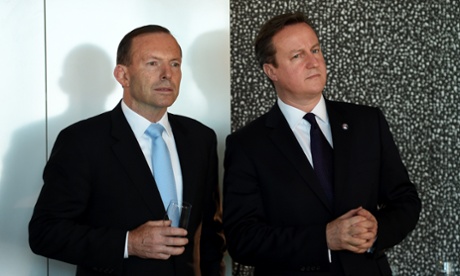
Besides the 5-Eyes spying agreement, the English-speaking democracies of the North Atlantic and the South Pacific are frequently said to have a few things in common. British prime minister David Cameron recited them perfectly before the Australian parliament on Friday: “open economies and open societies”, a free press, and “real democracy and the rule of law” safeguarded by liberal institutions.
These fantasies underpin the canonical history of what the rightwing calls the Anglosphere. Conservative thinktankers get misty-eyed when they hear speeches like these, which downplay the way in which these English traditions were imposed by settler colonists on countries stolen from their indigenous inhabitants. The Australian prime minister, Tony Abbott, did just that in his introduction to Cameron’s visit:
It’s hard to think that back in 1788 [Sydney] was nothing but bush and that the marines and the convicts and sailors ... must have thought they had come almost to the moon.
Right now the Anglosphere nations share another institution: everywhere, the political right is in charge, despite the times offering us reasons to vote for parties emphasising leftwing notions of environmental responsibility, equality, and military restraint.
The Intergovernmental Panel on Climate Change has just reminded us again that the planet is frying beneath our feet. Economic inequality has widened in the Anglosphere over the last 30 years, and even more sharply in the last decade. In the “recovery” from the global financial crisis, in the UK and the US middle class incomes have declined, with the gains going to the very rich. In former welfare states like the UK, austerity policies are literally starving vulnerable citizens. Conservatives in other Anglosphere countries, like Australia’s treasurer Joe Hockey, would dearly like to follow the Tories’ example.
The only exemption to the defunding of public services are military and intelligence agencies — the air forces of Australia, Canada, the US and Britain are busy fighting in a new phase of the endless, profligate, unwinnable war in the Middle East. Over the course of this war, intelligence cooperation between the proud liberal democracies of the Anglosphere has evolved into what Edward Snowden has called a “supra-national intelligence organisation that doesn’t answer to the laws of its own countries”.
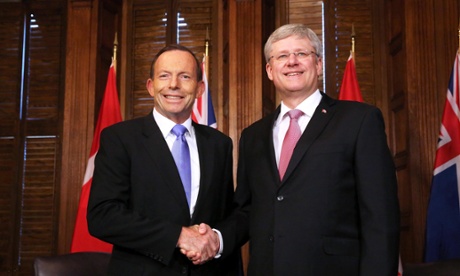
Despite all this, the right are enjoying a new heyday that puts the Thatcher and Reagan years in the shade. Australia is ruled by the most reactionary national government in its history. Stephen Harper, having first transformed Canadian conservatism into a simulacrum of the US Republican party, is now remodelling the country itself as a petro-state. In New Zealand, a scandal implicating prime minister John Key’s staff in the smearing of political rivals did not prevent his National party government being returned in September. In the UK an austerity-mad Tory-led coalition government is drifting further right, as it (and Labour) dance to a tune set by the golf club bigots in Ukip. In the US, Republicans — who have spent the last four years obstructing Obama’s painfully modest agenda — are now making conciliatory and cooperative noises because they are effectively the party of government, and are seeking to clear the way for their own agenda.
Each country has its own internal political dynamics. In each case the right has come to power in different ways. But these groupings share a lot of ideological common ground. This is no accident — multinational corporate lobbying, a global network of thinktanks, and the planetary echo chamber afforded by organisations like Rupert Murdoch’s News Corporation keeps right wing ideas circulating and resonating throughout the English speaking world.
Anglosphere conservatives want to erode whatever remains of their respective welfare states, with a particular emphasis on wrecking social security, education and public health. They have profited by scapegoating immigrants or refugees, and stoking paranoia about border security. More so than in previous eras of rightwing ascendancy, they are joined at the hip to the carbon merchants whose products are worsening the climate disaster already under way. While Abbott waxes lyrical about the civilising properties of coal, Harper redesigns Canada’s foreign policy around getting the products of its dirty oil sands industry to market. In the US, the Koch brothers and other carbon moguls bankroll the Republican party. If New Zealand and UK conservatives are less strident on this topic, it’s because their carbon industries are nonexistent or were deliberately destroyed. Right now, they’re all committed to the negotiation of a Trans -Pacific Partnership that economist Joseph Stiglitz says benefits “the wealthiest sliver of the American and global elite at the expense of everyone else”.
The funny thing is that — with the exception of Key’s relatively moderate government — all of these rightwing majorities are unpopular. Obama’s approval ratings may be catastrophically low, but Congress’s are even lower — the Republican takeover is based on the consistent support of a small, well-mobilised, conservative fraction of the electorate and the refusal of erstwhile Democrat supporters to turn out to vote. Since their failure to win a majority in their own right, the UK Tories — whose MPs are virtually all stationed in the countryside and comfy suburbs of England — have only declined in their standing. In Australia the Liberals’ polling has been in an election-losing position almost since they came to government, and the electorate have resolutely disliked Abbott since before he assumed power. In Canada, Harper has been in negative electoral territory for well over a year.
Their ideas aren’t well-liked, either. In Australia, the Abbott government has sustained most of the damage to its standing following the passage of a budget that the electorate correctly judged to be unfair to the most vulnerable. In the recent mid-terms, despite returning Republican candidates, US electorates passed a raft of progressive initiatives, including several mandating a rise in the local minimum wage, a couple making recreational marijuana legal, and even some mandating maximum class sizes in public schools.
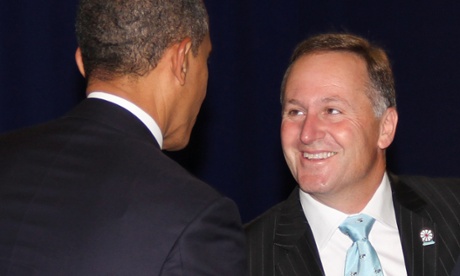
Alaska, for example, returned a Republican senator and congressman at the same time that it legalised marijuana, voted for a minimum wage, and restricted mining to protect salmon refuges; a measure aimed at re-imposing taxes on oil companies only narrowly failed. In the UK, you could be forgiven for thinking from media coverage that immigration is the uppermost priority for voters. In fact, it’s increasing funding to the NHS, which the Tories would like to eviscerate even more thoroughly than they have. In all of these countries, polling shows that the decline of public services, privatisation, and economic insecurity are perennial concerns for large swathes of their respective electorates.
The main reason the right finds itself in this position is not their own strength, or the broad acceptance of their ideas, but the weakness of mainstream leftwing parties. Partly this is down to a lack of effective political leadership. While Republicans ran against the president in the US midterms, so, often enough, did his Democrat colleagues. So desperate were they to avoid any association with him that some were led to refuse to admit that they had ever voted for him. Not only were candidates distancing themselves from what Jeb Lund called Obama’s “one major legislative achievement”, the Affordable Care Act, but they also gave only lukewarm support to the progressive ballot measures (and attendant social movements) that any sensible centre-left party might have viewed as a source of potential renewal. In the UK, Ed Miliband’s personal unpopularity is equalling the records previously set by Lib-Dems leader Nick Clegg. In Australia, Labor leader Bill Shorten’s bizarre communication style is good fodder for comedians, but perplexing for everybody else.
Leaders tend to look better when they are moving in a discernible direction. The real problem for centre-left parties in the Anglosphere is that it’s very difficult to tell what their objectives are, and what, if anything, they stand for. (If any Australian can provide me with a succinct account of contemporary “Labor Values”, I’m dying to hear it).
Having spent the last three decades chasing conservatives rightwards in pursuit of a mythical centre, it may be that politicians are as confused as voters are. Between them the social democratic governements of Bob Hawke and Paul Keating, Bill Clinton and Tony Blair redefined progressive policy, seeking to effect social change through market-based, capital-friendly mechanisms. Capital showed precious little gratitude to them, and none to their successors. But the habit of trying to please everyone, including the vested interests who actually need to be confronted in order to bring about lasting change, dies hard.
A few recent examples show how this tends to play out. In Australia, Kevin Rudd was elected to the prime ministership in 2007 with a mandate to address climate change. With the country in drought, and the conservatives reeling from a devastating loss partly driven by climate concerns, the opportunity was there to act. Unfortunately the main game — constraining the ability of powerful industries to continue polluting the atmosphere — became somewhat obscured. The ALP had only one plan on the table, an emissions trading scheme. Emissions trading represents the mainstream international progressive consensus, but actually has its origins in the interactions between economics and the emerging environmental movement in the 1970s. Green groups seeking victories by speaking in the respectful tones of economics have also made emissions trading a cause celebre. (Recently published books by Naomi Klein and Philip Mirowski are informative on this point.)
As soon as Rudd’s government introduced legislation, emissions trading began to do the political work it is designed to do. The political energy and momentum attached to climate action was, as Mirowski puts it, “diverted into the endless technicalities of the institution and maintenance of novel markets for carbon permits”, while “emissions [continued] to grow apace in the interim”. In effect, a government with a strong mandate to curb carbon emissions was destroyed by the politicking around the technical settings of a scheme which tried to avoid alienating voters, consumers and the carbon industry, and wound up pleasing no one. The incoming Abbott government has dismantled Labor’s scheme just as it was beginning to curb emissions. Now the likelihood of Australia implementing any meaningful action any time in the next decade seems remote. So much for centrist pragmatism.
In the US, what was the Democrats’ proudest progressive achievement — universal health insurance — was, in the mid-terms, a millstone around their necks. Progressives like to blame such reversals on the perversity of voters who do not properly recognise their own interests, and to be sure, many of those who vociferously opposed the scheme before its introduction did so on the basis of rumours about doctors being forced on them and speculation about “death panels”. The lasting unpopularity of the Affordable Care Act, however, is as a result of its failing to deliver the progressive goal of universal, equitable health care.
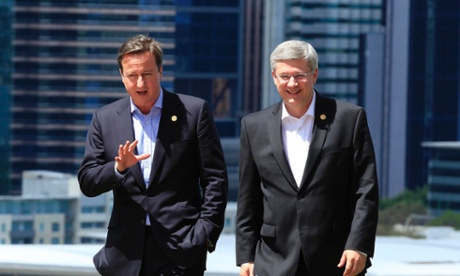
Instead of a “single-payer” scheme — of the kind that Obama himself supported before 2004 — a Democrat controlled congress and White House implemented a scheme designed in outline by the Heritage Foundation and first applied by Mitt Romney. The origins are important when we notice what the scheme does: maintains a transactional, privatised model of healthcare rather than a public one, and allows the insurance industry to continue extracting rents while paying out as little as possible.
Though it extends at least some coverage to those who may otherwise have had none, it also imposes high mandatory costs on low- to middle-income earners (up to 9.5% of their income). It does this without removing the risk of bankruptcy in the case of serious or debilitating illness, and without getting rid of high out of pocket expenses. That means that in a bad year, up to a third of a household’s income could disappear in health costs.
Many argue that the mainstream left favours these doomed schemes because they have been corrupted by the money politics of contemporary democracies, so that appeasing corporate donors has become more important than serving voters. To some extent, that’s no doubt true. But there is something more fundamental happening that goes to a suffocating Anglophone policy orthodoxy, and a lack of confidence in real progressive ideas.
Since the end of the Cold War (or even slightly before in Australia) centre-left parties have become essentially defensive, while the social democracies they helped build are eroded, sometimes by their own hand. In the view of the Blair-Clinton-Keating “third way”, the hangover from which still informs our centre-left parties, markets can only ever be negotiated with – never controlled. Economics is understood to be the authentic language of politics.
This orthodoxy is reinforced in the schools of government, economics and law that serve as political finishing schools for professional politicians, cut off from the social movements that once nourished their parties. It is repeated to them by the political advisers who attended the same schools. Even after the recession hollowed out the middle class, and increased the ranks of the poor, it has been assumed that the interests of the many can be made to coincide with the prosperity of the few. The left are terminally shy of picking fights.
The right have no such aversions. Whereas it’s difficult to say who centre-left parties see as their enemies outside the narrow field of electoral politics, the right target public sector workers, public broadcasters, academics and environmentalists for public attack. As the debate over economic issues has collapsed into consensus, it’s become easier for conservative parties sponsored by billionaires to mobilise their supporters on cultural issues, and to offer an inverse populism based on a hatred of elites. Fearing above everything the accusation of “class warfare”, the official left fails to ameliorate the condition of those going backwards, who will be hit hardest by looming environmental crisis.
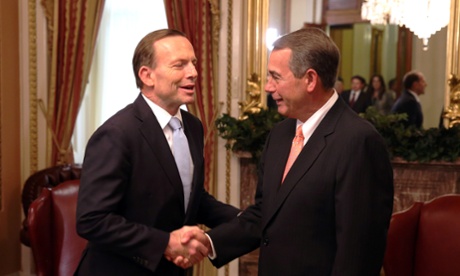
It’s evident that this unabashed antagonism has underpinned the right’s most significant victories, which consist in making their opponents take on their positions. The addiction of the centre-left to neoliberal economic orthodoxy is the least of this; the US Democrats and labour parties in the UK and Australia have taken on many of the right’s most frankly antidemocratic stances from sheer political timidity. In Australia, Liberal race-baiting has led Labor to mostly endorse the punitive treatment of asylum seekers, and they’re fully signed up to a continued war in the middle east. Labour in the UK are currently tracking right on immigration, having spent their last period in government refining methods for disciplining and surveilling those left behind by a deindustrialised economy. In the US, Obama has authorised extrajudicial drone executions, left Guantanamo open, and is leading the Anglosphere back into Iraq. The official left shows a contempt for the values of its natural supporters that the right would never dare to, or think to.
When Rudd and Obama were elected in quick succession, commentators rushed to draw a line under the neoliberal era that began with Reagan and Thatcher. They spoke too soon. On current form, if anyone is to do that, they will either will not be a part of mainstream left wing parties, or they will come from outside the advanced liberal democracies of the Anglosphere, where politics is less hostile to new and radical ideas.
Third parties like the Greens are attracting support in the UK and particularly in Australia, where Labor appears to have permanently conceded a quarter of its primary vote to the environmental party. But in those countries and in the US, the most inspiring initiatives may come from the citizenry itself. While ossified progressive parties actively reject the vitality of newer social movements concerned with the environment, inequality and new forms of identity politics. The desire for relevance may eventually persuade them that they need to pay closer attention to those demanding that capital be reined in, in the interests of the people and the planet.
Elsewhere, and particularly in Latin America, it’s evident that democratic socialism is still a possibility, and a field of experimentation. Their leaders’ commitment to basic economic justice is not only something that the Anglosphere’s left ought to take on, but which may be necessary for its survival. Those who say we have nothing to learn from still-developing economies have not paid enough attention to regressive developments closer to home. The millions who have been and soon will be immiserated by the machinery of liberal capitalism will have little time for the morality tales of neoliberalism. If existing centre left parties do not speak to their demands, who will?

No comments:
Post a Comment